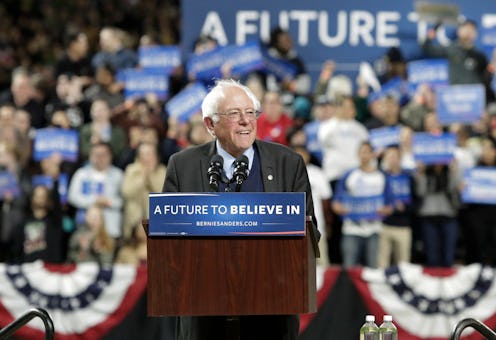News
How Many People Voted In Washington State?
Western states had their chance to caucus on Saturday. Three Democratic caucuses took place in Alaska, Hawaii, and Washington — the latter of which was simply make or break for Vermont Sen. Bernie Sanders. The Evergreen State boasted the most delegates up for grabs, offering up as many as 101 to the winning candidate. Additionally, 17 superdelegates are free to pledge their support in favor of whomever they please. Though trailing behind frontrunner Hillary Clinton, Sanders made major gains on Western Saturday. His sweep of all three states netted him a substantial amount of delegates thanks to heavy voter support. Given what's at stake, many are wondering how many people voted in Washington state?
Despite predictions that the caucus turnout would rival that of the record-breaking 2008 election, Washington's numbers were exactly what people were expecting. Officials were expecting over 200,000 votes, and Washington Democrats communications director Jamal Raad tells Bustle that he estimates more than 230,000 Democrats turned out to caucus, "nearly matching the record of 246,000 set in 2008."
The Washington caucus process has multiple steps, which means 26,345 delegates were selected on Saturday. Raad says these delegates will move on to the legislative district and county caucuses, where 1,400 delegates will be chosen from the more than 26,000 to move on to the congressional district caucuses. At those congressional district caucuses, it will be pared down to 67 delegates that will go to the Democratic National Convention, and then at the state convention, the other 34 delegates who go to the national convention will be selected.
What's impressive is just how many voters were in favor of Sanders. Washington state was clearly feeling the Bern this weekend, and the Vermont senator received nearly 73 percent of the vote.
There has been an overall decline in voter turnout throughout the country, especially during presidential elections. Despite a marked increase in new voters during the 2012 election, 4.8 percent fewer citizens cast their ballots. There have been plenty of cases of caucus sites and poll locations overflowing with voters throughout this election season. However, record numbers appear to only be emerging on the Republican side. It's the consistently underwhelming showing of Democratic voters that appears to be dragging down numbers. According to a recent Pew Research Study of the 2016 primaries, those numbers have been on the decline since 1980.
Whereas skeptics of Sanders' wins point to low voter turnout numbers as being a potentially bad sign looking towards the Democratic National Convention, the presidential hopeful sees enough momentum to rival that of the Clinton campaign. Sanders said during an interview on ABC's This Week on Sunday:
A national poll just came out that had us 1 point ahead of Secretary Clinton, when we started 60 points behind. And every national and state poll that I have seen, virtually every one, has us defeating Donald Trump. CNN had us defeating him by 20 points. Clearly we have the momentum. And I think, at the end of the day, we're going to end up with more pledged delegates than Secretary Clinton.
The next big test for Democratic candidates comes in April, when delegate-rich states like Wisconsin, New York, Maryland, and Pennsylvania will be holding their primaries. Sanders is clearly hoping to maintain his momentum no matter how many voters show up for their respective primary day.
Editor’s Note: This story has been updated from its original version to reflect that there were 26,345 delegates selected and more than 230,000 people who cast a vote, according to Jamal Raad, the Washington Democrats communication director.
